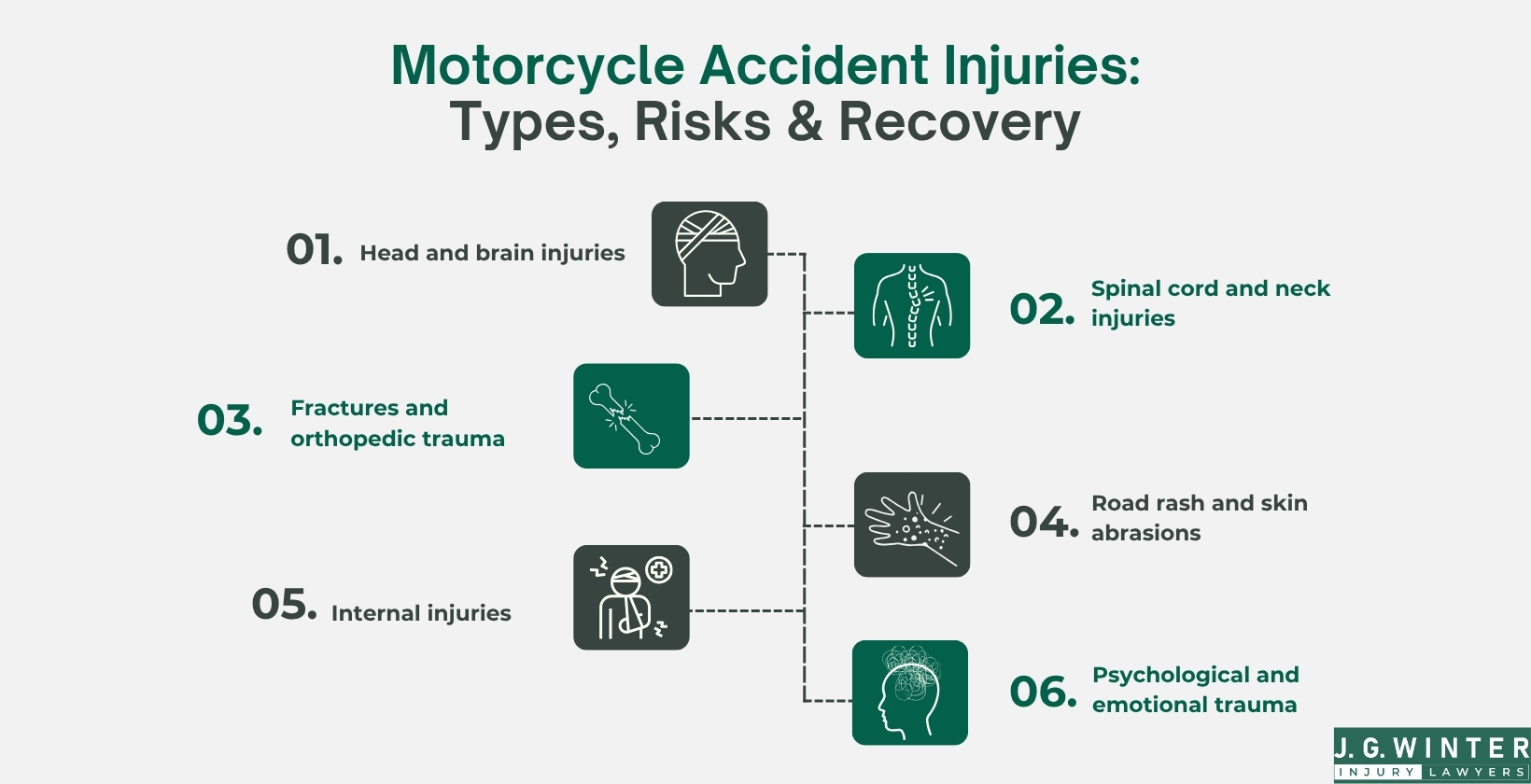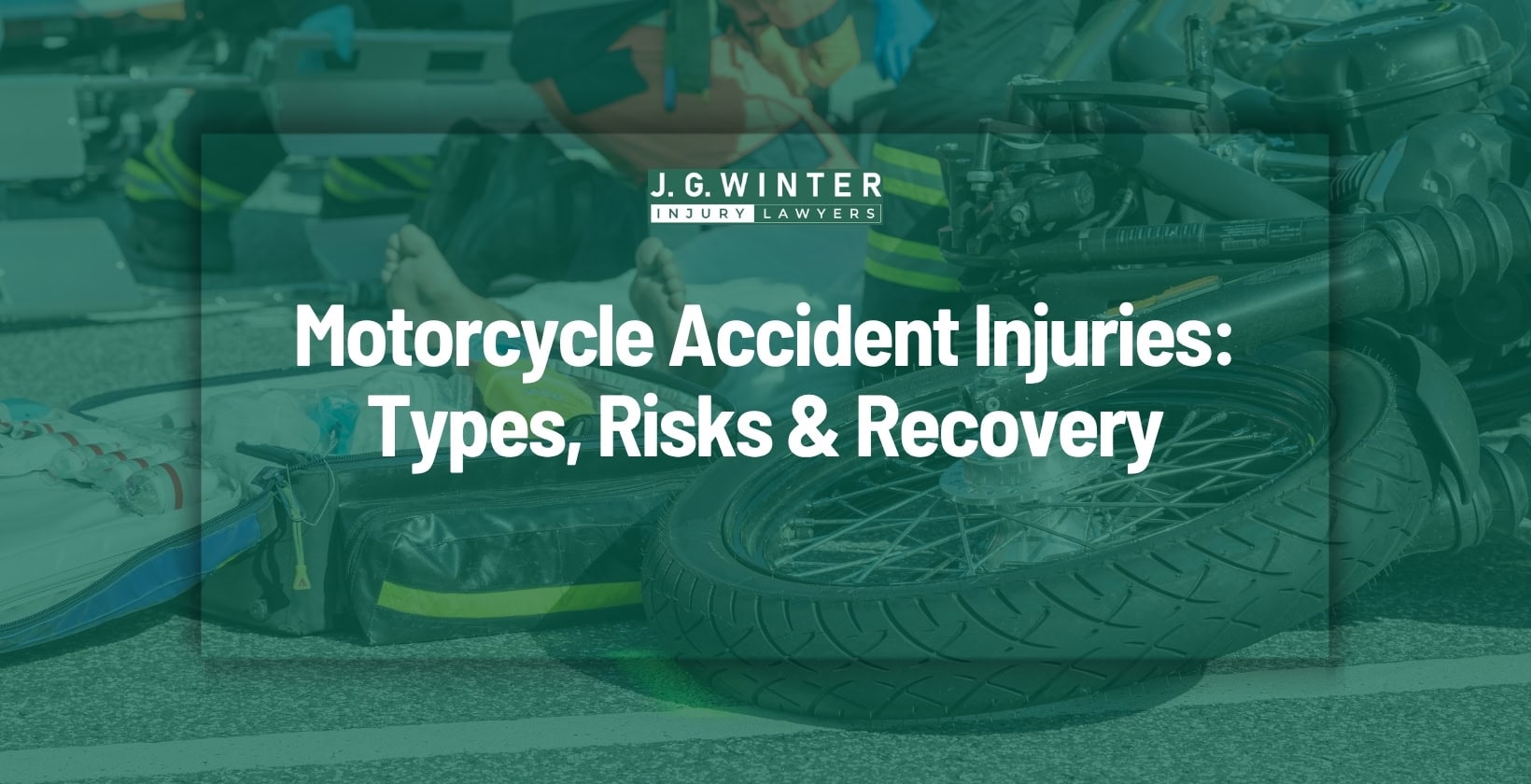Motorcycle accident injuries can be life-changing, but they don’t have to define your future. Though riders are more exposed on the road, the right medical care, legal support, and recovery plan can help turn a devastating moment into a powerful comeback.
These injuries may be serious, but the story doesn’t end there-it continues with strength, support, and a clear path forward. Beyond broken bones or road rash, many face emotional challenges and financial strain, but with the right guidance, these hurdles can be overcome.
Recognizing the full scope of a motorcycle accident’s impact is the first step toward taking back control of your life.
Whether you’re learning about the types of injuries, long-term effects, or how to navigate the recovery process, each insight brings you closer to confidence and clarity.
If you’re seeking answers, reassurance, or the next step after the unexpected, you’re not alone, and you’re exactly where you need to be.
6 Common types of motorcycle accident injuries
Motorcycle crashes often result in far more serious injuries than other types of vehicle accidents due to the lack of external protection. From painful abrasions to catastrophic trauma, the severity can range widely, but the consequences are always real.
Here are 6 of the most frequently sustained injuries riders face, each with the potential to cause long-term physical, emotional, and financial challenges:
1: Head and brain injuries
Head and brain trauma are among the most devastating outcomes of a motorcycle accident. Even with a helmet, riders remain vulnerable to concussions, traumatic brain injuries (TBIs), permanent cognitive impairment, and, in severe cases, death.
What makes these injuries especially dangerous is that symptoms aren’t always immediate. Signs such as confusion, memory loss, personality changes, seizures, or loss of consciousness may surface hours or even days later, making prompt medical evaluation absolutely critical.
Early diagnosis and intervention can be the difference between a manageable recovery and lifelong consequences. If there’s any suspicion of head trauma, don’t delay seeking emergency care.
2: Spinal cord and neck injuries
Injuries to the spinal cord or neck are among the most life-altering consequences of a motorcycle crash. Depending on the severity and location of the trauma, victims may face partial or complete paralysis, loss of sensation, or long-term neurological complications.
Even less severe conditions, like herniated discs, nerve compression, or whiplash, can lead to persistent pain, reduced mobility, and significant limitations in daily life. What may seem minor at first can quickly evolve into a chronic and debilitating issue.
Recovery from these injuries is often long, complex, and emotionally draining. It may involve surgery, physical therapy, and ongoing care. Early diagnosis and consistent treatment are critical to maximizing recovery and improving long-term outcomes.
3: Fractures and orthopedic trauma
Motorcycle crashes frequently result in complex fractures and orthopedic injuries, as the rider’s body absorbs the full force of impact with little to no protection. These injuries can be both painful and debilitating, often requiring intensive medical intervention.
Common fractures include the tibia and fibula (lower leg), wrists, hands, forearms, shoulders, hips, pelvis, and even the skull or facial bones. Depending on the severity, treatment may involve bone realignment, external fixation devices, or surgical repair, often followed by months of physical therapy.
Orthopedic trauma can severely limit mobility, delay return to work, and impact quality of life. Prompt, specialized care is critical not only for physical healing but also for restoring independence and function.
4: Road rash and skin abrasions
Road rash may sound minor, but it can be one of the most painful and serious injuries sustained in a motorcycle accident. When a rider is thrown from the bike and slides across the pavement, the friction can tear away multiple layers of skin, sometimes down to muscle or bone.
These injuries can range from superficial scrapes to deep abrasions that carry a high risk of infection, nerve damage, and permanent scarring. Severe cases may require surgical intervention, including skin grafts, and often lead to long-term physical and emotional effects.
Immediate medical treatment is essential to prevent complications and support proper healing. What begins as “just a scrape” can quickly turn into a serious medical issue without proper care.
5: Internal injuries
Internal injuries are some of the most dangerous consequences of a motorcycle accident, often hidden, yet potentially life-threatening. Trauma to vital organs such as the liver, spleen, lungs, or kidneys can occur even in low-speed collisions due to the force of impact.
What makes internal injuries especially concerning is their silent nature. Victims may initially feel fine, only to develop symptoms like abdominal pain, swelling, deep bruising, dizziness, or fainting hours or days later. Without timely diagnosis, internal bleeding or organ damage can quickly become fatal.
Because these injuries are not always visible, immediate medical evaluation after any motorcycle crash is essential, regardless of how minor the incident may seem.
6: Psychological and emotional trauma
Not all motorcycle accident injuries are visible. The emotional and psychological aftermath can be just as debilitating as physical wounds, sometimes even more so. Survivors often struggle with conditions such as post-traumatic stress disorder (PTSD), anxiety, depression, or adjustment disorders that affect their ability to return to normal life.
These mental health challenges can disrupt sleep, concentration, mood, and relationships, making daily routines feel overwhelming. Emotional recovery is a crucial part of the healing process and should never be overlooked.
Common signs of psychological trauma include:
- Persistent fear of riding or panic in traffic
- Feelings of hopelessness, sadness, or lack of motivation
- Nightmares, insomnia, or difficulty sleeping
- Flashbacks or intrusive memories of the crash
- Guilt or shame, especially when others were injured
Acknowledging emotional trauma and seeking professional help is not a sign of weakness; it’s an essential step toward true recovery and reclaiming peace of mind.

Hidden risks after motorcycle crash injuries
While many motorcycle injuries are immediately visible, there are hidden risks and signs that should never be ignored after a crash. These hidden signs can be far more fatal than apparent damages.
Delayed symptoms that can be dangerous
After a motorcycle accident, the body often goes into shock, releasing adrenaline that can temporarily mask pain and injury. As a result, many victims walk away believing they’re unharmed, only to experience serious complications days or even weeks later.
Delayed symptoms can signal internal injuries, neurological damage, or psychological trauma that require urgent medical attention. Ignoring these signs can put your health, and even your life at risk.
Be alert for the following warning signs after an accident:
- Abdominal pain or swelling: May indicate internal bleeding or organ damage.
- Headaches, dizziness, or confusion: Can point to a concussion or brain hemorrhage.
- Back, neck, or shoulder pain: Often tied to soft tissue injuries, spinal trauma, or herniated discs.
- Behavioral or mood changes: Could reflect underlying PTSD, anxiety, or depression.
- Unexplained bruising: Might signal internal bleeding or ruptured blood vessels.
No matter how minor the crash may seem, always seek a thorough medical evaluation. Early detection of hidden injuries can prevent long-term complications, and potentially save your life.
Internal bleeding and organ damage are often missed
Internal injuries are some of the most dangerous, and most overlooked consequences of a motorcycle accident. Because symptoms may be delayed, subtle, or entirely absent at first, many victims don’t realize they’re seriously injured until it’s too late.
Signs such as unexplained weakness, dizziness, abdominal pain, rapid heart rate, or fluctuating blood pressure can all point to internal bleeding or organ damage. These symptoms should never be ignored, even if the crash seemed minor.
Unlike external injuries, internal trauma cannot be diagnosed through a simple physical exam. It often requires advanced imaging tests such as CT scans, ultrasounds, or MRIs to identify damage and begin timely treatment. Delayed diagnosis can lead to life-threatening complications.
If there’s any doubt after an accident, insist on a full medical evaluation. When it comes to internal injuries, early detection can be the key to survival.
When “minor” injuries turn into major health risks
Not all injuries reveal their full severity right after a motorcycle accident. What may appear as a simple bruise, cut, or muscle soreness can mask deeper, more serious trauma beneath the surface. Without proper care, these seemingly minor injuries can evolve into long-term health complications.
Be especially cautious if you notice any of the following:
- Pain that intensifies instead of gradually improving
- Swelling that increases, becomes firm, or changes color
- Tingling, numbness, or weakness in your limbs
- Difficulty moving, breathing, or standing upright after a day or two
If anything feels unusual or worsens with time, don’t dismiss it. Listen to your body and seek medical attention right away. Early intervention can prevent lasting damage and support a smoother, safer recovery.
How motorcycle accident injuries affect your life in the long run?
Motorcycle injuries don’t just heal and go away; they often leave long-term effects that follow you for months or even years. From physical pain to emotional trauma and financial pressure, here’s what many victims face after the crash.
Ongoing physical pain and mobility issues
Motorcycle accidents often lead to more than just short-term injuries, they can cause chronic, life-altering conditions that affect every part of a victim’s life. Injuries such as spinal cord trauma, traumatic brain injuries (TBIs), and complex fractures can result in long-term pain, limited mobility, and permanent disability.
Common long-term complications include:
- Chronic pain: Ongoing discomfort caused by nerve damage, joint trauma, or scar tissue.
- Post-traumatic arthritis: Degeneration of joints at the injury site, especially in weight-bearing areas like the knees and hips.
- Restricted mobility: Difficulty moving due to fused joints, dislocations, or damaged soft tissues.
- Paralysis: Partial or complete loss of motor function from spinal cord injuries.
- Nerve damage: Symptoms such as numbness, tingling, burning sensations, or muscle weakness in affected areas.
These conditions can disrupt daily routines, limit earning capacity, and take a toll on emotional well-being. Many survivors require long-term medical care, physical therapy, and assistive devices to maintain quality of life. Recognizing and treating these ongoing effects is essential for both physical recovery and legal compensation.
Financial stress from lost income and medical expenses
The financial impact of a motorcycle accident can be just as overwhelming as the physical injuries. Many victims face mounting expenses while being unable to work, creating a cycle of stress that affects every aspect of life, from household bills to future security.
Key sources of financial pressure include:
- Hospital and emergency care costs: Ambulance fees, surgeries, diagnostics, and extended inpatient stays.
- Ongoing rehabilitation expenses: Physical therapy, prescription medications, medical devices, and home modifications.
- Lost wages and income: Time away from work during recovery, or inability to return to a physically demanding job.
- Career disruption or loss: Long-term disabilities that prevent victims from resuming their previous roles or advancing professionally.
These financial burdens can quickly spiral without proper support. That’s why seeking compensation for both immediate and future losses is critical, not just for recovery, but for regaining financial stability and peace of mind.
Emotional effects including PTSD and depression
Emotional effects after a motorcycle accident often persist long after physical recovery. Trauma, lifestyle disruption, and permanent disability cause long-term psychological damage that demands professional treatment. The most common outcomes include:
- Post-Traumatic Stress Disorder (PTSD): Recurring flashbacks, panic, and emotional detachment.
- Chronic depression: Persistent sadness, low energy, and hopelessness.
- Generalized anxiety: Ongoing worry, guilt, and fear of recurrence.
- Social withdrawal: Reduced interaction due to emotional or physical limitations.
- Insomnia or sleep disorders: Difficulty sleeping or nightmares tied to trauma.
- Cognitive impairment: Concentration and memory problems from stress or brain injury.
Recovery after a motorcycle accident: What to expect
Motorcycle accident recovery follows three stages: emergency care, physical rehabilitation, and long-term medical and mental support. Recovery time depends on injury severity; minor injuries heal in weeks, whereas severe trauma can take years.
Emergency medical care and early intervention
The first moments after a motorcycle accident are critical. Prompt emergency care not only stabilizes the victim but can mean the difference between full recovery and permanent damage. Immediate action helps prevent complications and sets the foundation for long-term healing.
Key steps during this phase include:
- Calling emergency services to ensure rapid medical response.
- Stabilizing injuries on-site and transporting the victim via ambulance.
- Using diagnostic imaging (CT scans, X-rays, ultrasounds) to assess internal injuries.
- Initiating trauma care, which may involve surgery, blood transfusions, or ICU monitoring.
Fast, skilled intervention during this phase saves lives, and preserves the best possible outcome for recovery.
Physical therapy and rebuilding strength
For many motorcycle accident victims, recovery doesn’t end with emergency care, it continues through physical therapy and rehabilitation when injuries impact movement, strength, or function. While not every injury requires extensive rehab, those with fractures, spinal damage, or soft tissue injuries often benefit significantly from a structured recovery plan.
When needed, physical therapy may involve:
- Gentle stretching and mobility work to prevent stiffness and maintain range of motion.
- Strength training and targeted exercises to rebuild muscle and support healing.
- Functional rehabilitation to restore independence in everyday activities and reduce long-term pain.
Rehabilitation timelines vary, and some individuals may require weeks or even months of consistent therapy to fully recover. Early intervention and expert guidance can greatly improve outcomes.
Long-term treatment and mental health support
Serious motorcycle injuries often require more than initial medical care, they demand ongoing support to manage lasting physical and emotional effects. Long-term treatment focuses on improving quality of life, restoring functionality, and supporting mental well-being.
This phase may include:
- Chronic pain management, follow-up surgeries, or prosthetic care for lasting physical impairments.
- Mental health support, including therapy and counseling for PTSD, depression, or anxiety.
- Guidance in adjusting to lifestyle changes, building resilience, and maintaining emotional stability.
Comprehensive long-term care ensures that recovery isn’t just about surviving the crash, but rebuilding a meaningful, fulfilling life afterward.
What are your legal rights after a motorcycle accident injury in California?
If you’ve been injured in a motorcycle accident due to another party’s negligence, you may be entitled to recover damages through a personal injury claim. This legal remedy allows you to seek full and fair compensation for both economic and non-economic losses associated with your injuries.
Compensable damages may include:
- Medical expenses: Reimbursement for emergency care, hospitalization, surgery, medication, physical therapy, and other necessary treatments.
- Lost wages and diminished earning capacity: Compensation for income lost during recovery and any future reduction in earning potential.
- Pain and suffering: Monetary damages for physical pain, emotional distress, and loss of enjoyment of life.
- Property damage: Costs to repair or replace your motorcycle and any other damaged personal property.
- Future medical care: Anticipated expenses for ongoing rehabilitation, specialist visits, or assistive devices.
An experienced personal injury attorney can help you assess the full extent of your damages, build a compelling claim, and negotiate for the compensation you lawfully deserve.
Legal challenges and comparative fault issues
Under California’s pure comparative fault system, your compensation may be reduced in proportion to your share of fault for the accident. Insurance companies often exploit this rule to shift blame and minimize payouts, arguing, for example, that your failure to wear a helmet contributed to the severity of your injuries.
Other legal obstacles may include:
- Disputed liability: The at-fault party may deny responsibility or attempt to deflect blame.
- Insurance delays and denials: Providers may delay claims processing or undervalue your damages.
- Insufficient documentation: A lack of medical records, accident reports, or witness statements can weaken your claim.
Clarity of liability
Clear liability, such as a rear-end collision with strong witness support, increases your chances of winning. If both parties dispute fault or the details are unclear, your chances of success decrease. Visual evidence or police reports that support your version of events are key.
Strength of your evidence
Winning cases rely on strong documentation. Essential evidence includes medical records, accident scene photos, police reports, and a timeline of treatment. The more organized and verifiable your proof, the harder it is for insurers or defense attorneys to challenge your claim.
Effectiveness of your legal representation
Lawyers with specific car accident experience often achieve better results than generalists. They understand accident laws, insurance tactics, and court procedures. A skilled and highly experienced legal team like ours at J.G. Winter can make the difference between a low offer and full compensation.
Insurance company’s defense tactics
Insurers often employ tactics such as blaming you for the crash, questioning the severity of your injury, or prolonging negotiations. These strategies reduce their payout risk. Anticipating and countering these defenses is crucial to protecting your settlement.
When to contact a motorcycle injury lawyer in Sacramento?
If you’ve been involved in a motorcycle accident in Sacramento, securing legal representation as early as possible is critical to protecting your rights and maximizing your compensation. An experienced Sacramento motorcycle accident attorney can preserve key evidence, manage communications with insurers, and ensure you are not taken advantage of during a vulnerable time.
You should consult a motorcycle injury lawyer immediately if:
- You sustained bodily injury or property damage as a result of the accident.
- Liability is being disputed or you are being unfairly blamed for the collision.
- You are unsure of your legal rights, claim value, or next steps.
- An insurance company has denied, delayed, or undervalued your claim.
Time is a crucial factor in personal injury cases. Early legal intervention allows your attorney to build a strong case, meet all statutory deadlines, and pursue the full compensation you are legally entitled to under California law
Why choose J.G. Winter Law for Motorcycle accident injury claim?
At J.G. Winter Law, we understand that a motorcycle accident can leave you facing not only physical pain but also emotional distress and financial uncertainty. That’s why we are committed to providing compassionate, results-driven legal representation for injured riders across Sacramento and Northern California.
What distinguishes our firm:
- Extensive experience in Northern California personal injury law, with a deep understanding of local courts, insurance tactics, and case nuances.
- Contingency fee structure, you pay no legal fees unless we successfully recover compensation on your behalf.
- Client-focused advocacy, offering personalized guidance, direct access to your attorney, and unwavering support at every stage of your case.
J.G. Winter delivers local expertise and proven results for citizens of Sacramento, Folsom, and the greater Northern California region. With over 20 years of success in car accident cases, our firm negotiates, litigates, and secures millions in compensation for clients, covering medical bills, lost income, pain and suffering, and property damage.
We don’t just handle cases, we stand with you during one of the most difficult times in your life. Let us fight for the justice and compensation you rightfully deserve. Contact us today.


